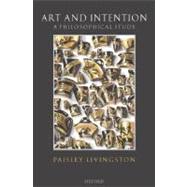Art and Intention A Philosophical Study
, by Livingston, Paisley- ISBN: 9780199278060 | 0199278067
- Cover: Hardcover
- Copyright: 4/28/2005
Do the artist's intentions have anything to do with the making and appreciation of works of art? In Art and Intention Paisley Livingston develops a broad and balanced perspective on perennial disputes between intentionalists and anti-intentionalists in philosophical aesthetics and criticaltheory. He surveys and assesses a wide range of rival assumptions about the nature of intentions and the status of intentionalist psychology. With detailed reference to examples from diverse media, art forms, and traditions, he demonstrates that insights into the multiple functions of intentionshave important implications for our understanding of artistic creation and authorship, the ontology of art, conceptions of texts, works, and versions, basic issues pertaining to the nature of fiction and fictional truth, and the theory of art interpretation and appreciation. Livingston argues that neither the inspirationist nor rationalistic conceptions can capture the blending of deliberate and intentional, spontaneous and unintentional processes in the creation of art. Texts, works, and artistic structures and performances cannot be adequately individuated in theabsence of a recognition of the relevant makers' intentions. The distinction between complete and incomplete works receives an action-theoretic analysis that makes possible an elucidation of several different senses of 'fragment' in critical discourse. Livingston develops an account of authorship,contending that the recognition of intentions is in fact crucial to our understanding of diverse forms of collective art-making. An artist's short-term intentions and long-term plans and policies interact in complex ways in the emergence of an artistic oeuvre, and our uptake of such attitudes makesan important difference to our appreciation of the relations between items belonging to a single life-work.The intentionalism Livingston advocates is, however, a partial one, and accomodates a number of important anti-intentionalist contentions. Intentions are fallible, and works of art, like other artefacts, can be put to a bewildering diversity of uses. Yet some important aspects of art's meaning andvalue are linked to the artist's aims and activities.






